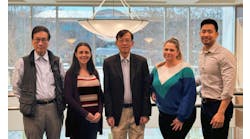In an interview with Healthcare Innovation, Karen Murphy, R.N., Ph.D., Geisinger’s chief innovation officer, described its partnership with digital health startup Noteworth on a new care delivery model for patients with chronic diseases like diabetes, heart failure and hypertension.
Called ConnectedCare365, the virtual care delivery platform will seek to use remote patient monitoring, artificial intelligence and analytics to improve patient outcomes.
Danville, Pa.-based Geisinger includes nine hospital campuses, a health plan with more than half a million members, a research institute. It has nearly 24,000 employees and more than 1,600 employed physicians.
“The vision that we're trying to create here is that we're redesigning our chronic disease management,” Murphy said. “We're leveraging remote patient monitoring and patient-reported outcomes, and we’re leveraging the platform to really stay in touch with our patients. Rather than episodic care, Geisinger will use technology to engage patients in a much different way.
ConnectedCare365 allows patients to monitor their weight, blood pressure, glucose, and other metrics using a smartphone app. By analyzing patient-generated data and relevant information from the electronic health record, the platform communicates directly with the patient’s care team, allowing clinicians to triage and prioritize care for high-risk patients to prevent unnecessary emergency room visits and hospitalizations. The platform also keeps patients and their families and caregivers engaged with care teams through direct messaging, Geisinger said.
Murphy said that although Geisinger has learned some lessons about remote care during the pandemic, this journey actually began two years ago. That included focus groups with providers and patients, mapping out care journeys, and doing due diligence on the technology. “We're leveraging artificial intelligence and machine learning to expand our care management capabilities in an efficient way,” she added. “We'd like to start using technology to engage with the ‘rising risk’ population.”
Initially, Geisinger will target several conditions, including diabetes, heart failure, hypertension and stroke. “Another use case is using this platform as a way to communicate with our patients discharged from the hospital,” Murphy said.
Jersey City, N.J.-based Noteworth said its single, modular platform can be used alone or integrated with any EHR. The company said its platform eliminates the need for disparate point solutions to address different aspects of virtual care, including condition management, remote patient monitoring, home health, behavioral health, telemedicine, and patient engagement. The Noteworth platform combines patient engagement and behavioral interventions with built-in alerts to increase touchpoints and pass key information to clinical staff to identify problems that could lead to complications or hospitalizations. Noteworth facilitates proactive interventions when they are needed most.
Murphy said the system will use predictive analytics, as well as real-time analysis of clinical and patient-generated data, to help keep the providers from getting alert fatigue or having to sort through too much patient-generated data. “We want to partner with the providers when we recognize that there's a problem so that we can address the issue,” she said.
She added that although they started the work before COVID-19, “the pandemic showed us we could do a lot more care delivery in the home,” Murphy said. “I think the second piece is that we universally bought into realizing that we have the capability of pretty much transforming anything. We were able to transform the organization to meet the needs of the patients in the communities that we were serving. And that innovation took place in weeks and days as opposed to years and months. I think we can keep that exuberance — knowing that the only barriers we have to transformation are those that we put on ourselves.”


